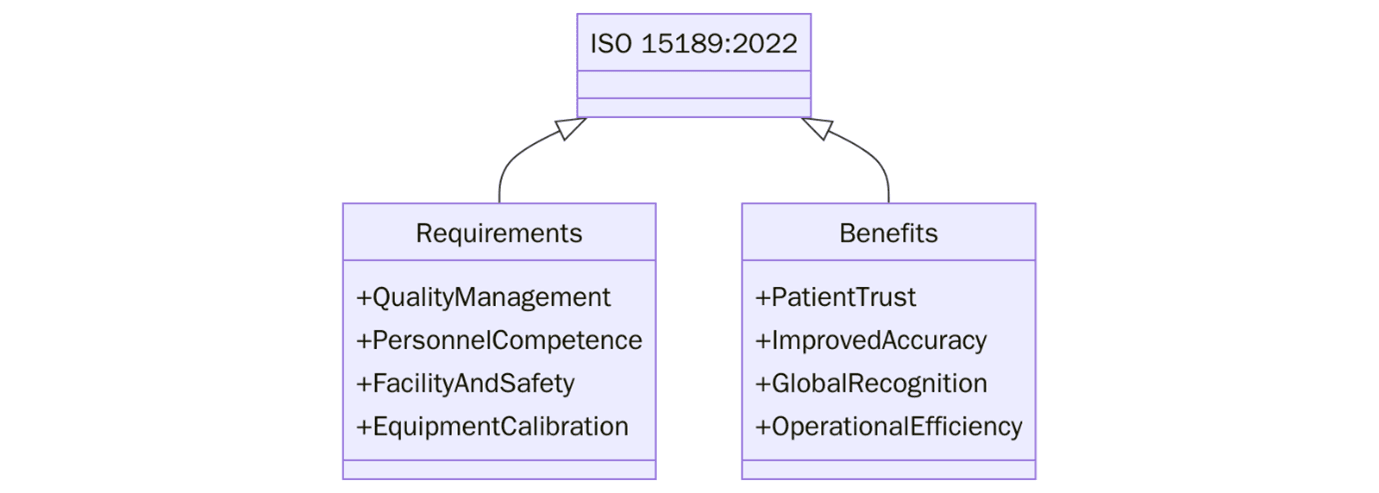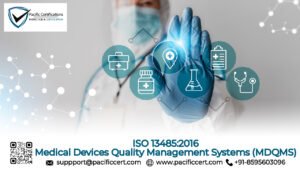What is ISO 15189:2022?
ISO 15189:2022 is the latest international standard that specifies requirements for quality and competence in medical laboratories. It provides a comprehensive framework for implementing a quality management system (QMS) specific to the medical testing environment, ensuring both technical accuracy and patient-centered outcomes.

The 2022 revision aligns more closely with ISO/IEC 17025 (testing and calibration labs) and ISO 9001 (quality management systems), incorporating risk-based thinking, patient safety, data integrity, and continuous improvement. It is intended for use by medical laboratories developing their QMS and for accreditation bodies conducting assessments.
By adopting ISO 15189:2022, laboratories can demonstrate technical competence and their commitment to quality, patient care, and international best practices.
Need help aligning your medical laboratory with ISO 15189:2022? Contact us at support@pacificcert.com!
Scope and Applicability
ISO 15189:2022 applies to all medical laboratories, including those in:
- Hospitals and clinics
- Diagnostic chains and pathology labs
- Public health institutions
- Research and academic labs performing clinical testing
- Mobile and point-of-care testing units
The standard applies across the entire testing process: pre-examination, examination, and post-examination. It covers personnel competence, equipment calibration, test method validation, sample handling, and reporting of results. Regardless of size or scope, any laboratory performing human diagnostic testing can implement and benefit from ISO 15189:2022.
Want to assess whether ISO 15189 is applicable to your lab? Contact support@pacificcert.com.
Certification Process
Laboratories are accredited by a recognized national or international body (e.g., NABL, CAP, , ABIS, A2LA) based on compliance with ISO 15189.
Steps Toward Accreditation:
- Gap Analysis – Evaluate current quality and technical practices
- Scope Definition – Identify testing services and specialties
- QMS Development – Draft policies, SOPs, forms, and records
- Implementation – Train staff, validate methods, calibrate equipment
- Internal Audit and Management Review – Assess readiness
- Accreditation Audit – Assessment by an authorized accreditation body
At Pacific Certifications, we assist in building systems that meet ISO 15189 and other quality frameworks. Email us at support@pacificcert.com.
How to Implement ISO 15189:2022
Implementation requires a shift from just compliance to a culture of quality, safety, and continuous improvement.
Key steps include:
- Establishing a quality policy and objectives focused on patient outcomes
- Appointing a quality manager and creating a quality manual
- Mapping the entire laboratory process flow, including pre- and post-examination
- Ensuring competence of personnel through training, evaluation, and certification
- Validating test methods, equipment, and reagents
- Defining performance indicators and conducting regular internal audits
- Ensuring traceability, documentation, and result integrity
- Incorporating risk management into lab operations
We offer complete implementation toolkits and consulting, contact us at support@pacificcert.com!
Documentation Required
ISO 15189 requires extensive documentation to ensure traceability, repeatability, and quality. Required documents include:
- Quality manual and policy
- Organizational chart and job descriptions
- SOPs for all test methods and support processes
- Equipment logs and calibration certificates
- Validation and verification reports
- Sample handling and traceability records
- Internal audit reports and corrective action logs
- Staff competency and training records
- Risk assessments and incident reports
Need ready-to-use documentation templates? Email support@pacificcert.com!
Eligibility Criteria
ISO 15189 is applicable to:
- Laboratories conducting clinical diagnosis or testing on human samples
- Independent pathology labs and diagnostic networks
- Hospital-based clinical laboratories
- Research facilities performing clinical studies and human diagnostics
- Mobile laboratories and point-of-care testing facilities
Whether you’re a single-specialty lab or a multidisciplinary chain, ISO 15189 can help standardize quality and build trust. Need assistance determining your lab’s eligibility? Contact us at support@pacificcert.com!
Accreditation Costs
The cost of ISO 15189 accreditation depends on:
- Number of departments and test disciplines (hematology, biochemistry)
- Volume of testing and number of personnel
- Existing documentation and infrastructure maturity
- Training needs and corrective action implementation
- Support required for internal audits and mock assessments
We offer cost estimates after a detailed consultation. Contact us at support@pacificcert.com.
Accreditation Timeline
Week | Activities |
Week 1 | Gap analysis and QMS scoping |
Week 2 | Policy drafting, SOP creation, and staff roles finalization |
Week 3 | Method validation and calibration setup |
Week 4 | Staff training and internal quality control |
Week 5 | Internal audit and management review |
Week 6 | External accreditation audit and post-audit corrections |
Let us help you manage your accreditation journey, email support@pacificcert.com!
Clauses of ISO 15189:2022
Clause 4: General Requirements
Focuses on impartiality, confidentiality, legal compliance, and ethical behavior. Laboratories must ensure objectivity and integrity throughout their operations.
Clause 5: Structural Requirements
Outlines the need for an organizational structure that supports quality. It includes roles, responsibilities, independence, and accountability.
Clause 6: Resource Requirements
Addresses personnel competence, facility adequacy, equipment management, and environmental conditions. This ensures that all testing resources are suitable and maintained.
Clause 7: Process Requirements
Details the management of the entire testing process: from sample collection to result reporting. This clause emphasizes validation, traceability, risk control, and result accuracy.
Clause 8: Management System Requirements
Aligns closely with ISO 9001 principles. It includes quality objectives, documentation control, internal audits, complaints, and continuous improvement mechanisms.
Need help implementing each clause in your lab? Reach us at support@pacificcert.com.
Requirements of ISO 15189:2022
To comply with ISO 15189, laboratories must:

- Establish and maintain a quality management system
- Define roles, responsibilities, and organizational structure
- Ensure personnel competence through ongoing assessment and training
- Validate and verify examination procedures
- Maintain and calibrate equipment regularly
- Ensure proper sample collection, identification, storage, and traceability
- Monitor quality indicators and apply continuous improvement
- Handle customer complaints and nonconformities systematically
- Conduct regular internal audits and management reviews
- Maintain document control and data integrity throughout the testing lifecycle
We support full system design and documentation. Contact support@pacificcert.com
Benefits of ISO 15189:2022
- Standardized procedures and validated methods minimize diagnostic errors.
- Accredited labs gain trust from clinicians, regulators, and international clients.
- Meets mandatory requirements in many healthcare systems and international procurement.
- Structured workflows and regular audits reduce waste and rework.
- Performance indicators and feedback loops drive quality enhancement.
- Robust documentation and ethical standards protect labs from liability.
- ISO 15189 accreditation opens doors for partnerships, research collaborations, and patient referrals.
- Supports integration into broader organizational quality systems.

ISO 15189 is a benchmark for laboratory quality across the world. With rising demand for precision medicine, digital diagnostics, and personalized therapies, laboratories are under pressure to deliver reliable, timely, and traceable results.
The World Health Organization and the European Union have endorsed ISO 15189 as a foundation for lab accreditation, while national agencies like NABL (India), SANAS (South Africa), and JCI (global) recognize it in hospital and diagnostic center assessments.
Recent studies show that ISO 15189-accredited labs have 40% fewer nonconformities and 25% faster turnaround times compared to non-accredited facilities. It also improves public health surveillance, outbreak response, and cross-border diagnostic collaboration.
Want to future-proof your lab with ISO 15189:2022? Contact us at support@pacificcert.com!
How Pacific Certifications Can Help
We offer full-spectrum support for ISO 15189:
- Readiness assessments and gap analysis
- QMS and SOP development
- Staff training on quality, ethics, and safety
- Internal audits and mock accreditation audits
- Documentation and calibration toolkits
- Post-audit support and corrective action plans
Whether you’re preparing for your first accreditation or re-certifying under the 2022 revision, we guide you every step of the way. Get started today, email us at support@pacificcert.com!
FAQs for ISO 15189:2022
Is ISO 15189 certifiable?
Yes, laboratories are accredited (not certified) by recognized bodies based on ISO 15189.
Does it apply to research labs?
Only if they conduct human diagnostic testing. Otherwise, ISO/IEC 17025 may apply.
Can ISO 15189 be integrated with ISO 9001 or 13485?
Yes, it shares similar principles and can be implemented alongside other quality systems.
How often is accreditation renewed?
Usually every 2–3 years, with annual surveillance audits.
Is ISO 15189 mandatory?
It is not mandatory globally but is often required for public sector contracts, hospital partnerships, and international recognition.
Ready to get ISO 15189:2022 certified?
Contact Pacific Certifications to begin your certification journey today!
Suggested Certifications –
Read more: Pacific Blogs








